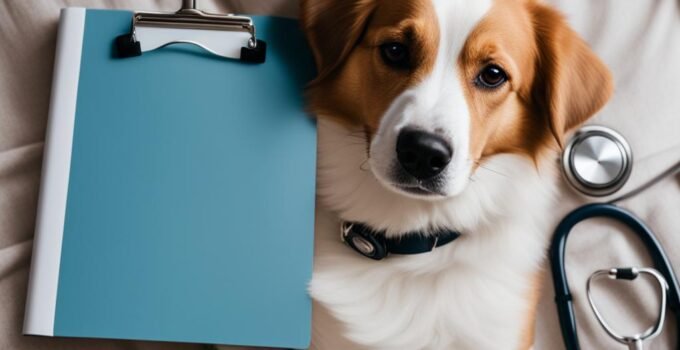As a pet owner, it is important to be prepared for all stages of your furry friend’s life, including pregnancy and birth. However, when it comes to pet insurance, there may be some confusion about whether or not pregnancy-related expenses are covered. In this article, I will delve into the topic of pet insurance and pregnancy coverage, providing you with the information you need to make informed decisions for your pet’s well-being.
When it comes to pet insurance, coverage for routine pregnancy costs such as exams, X-rays, and lab work is generally not included. However, some policies may provide coverage for complications that may arise during pregnancy, such as the need for a Cesarean section. It is important to carefully review the terms and conditions of your pet insurance policy to understand the specific coverage for pregnancy-related expenses.
Key Takeaways:
- Pet insurance policies generally do not cover routine pregnancy costs like exams and lab work.
- Coverage for complications, such as the need for a Cesarean section, may be available depending on the policy.
- Review the terms and conditions of your policy to understand the specific coverage for pregnancy-related expenses.
- Consider obtaining pet insurance before your pet becomes pregnant to be better prepared for potential complications.
- Consult with your veterinarian to ensure proper prenatal care and guidance throughout your pet’s pregnancy.
Understanding Average Costs of Pregnancy in Pets
Pet pregnancy costs can vary depending on the specific needs and circumstances. On average, prenatal care for dogs, including vaccines, deworming, and routine care, can cost between $150-300. Health clearances, which may involve X-rays and blood testing, can add an additional expense of around $1,000. Testing for Brucellosis, a bacteria that can cause miscarriage, may cost an average of $30-40. Ultrasounds and X-rays to monitor the pregnancy can range from $100-250. It’s important to remember that these costs are for pregnancies without complications, and if complications arise, the expenses can increase significantly.
| Prenatal Care Costs for Dogs* | Average Cost |
|---|---|
| Vaccines, deworming, and routine care | $150-300 |
| Health clearances (X-rays, blood testing) | $1,000 |
| Testing for Brucellosis | $30-40 |
| Ultrasounds and X-rays | $100-250 |
*Average costs may vary based on location and specific veterinary services.
Coverage for Complications During Pet Pregnancy
If your pet experiences complications during pregnancy, such as the need for a Cesarean section, the coverage provided by pet insurance policies may vary. Some policies may cover the fees for unforeseen treatments and procedures, including emergency C-sections. However, the coverage is often dependent on factors such as the date of breeding falling within the waiting period of the policy. It’s crucial to review your pet insurance policy carefully to understand the specific coverage for pregnancy-related complications.
**Table: Comparison of Pet Insurance Coverage for Pregnancy Complications**
| Insurance Provider | Coverage for Pregnancy Complications |
|——————–|————————————–|
| Company A | Yes |
| Company B | No |
| Company C | Yes |
| Company D | Yes |
| Company E | No |
As shown in the table above, coverage for pregnancy complications can vary depending on the insurance provider. It’s important to compare different policies and understand the terms and conditions to make an informed decision.
Medications and Treatments Covered by Pet Insurance
In case your pregnant pet experiences unexpected complications, such as the need for medications or treatments, some pet insurance policies may provide coverage. This coverage can include expenses related to emergency procedures like Cesarean sections. However, it’s important to note that not all pet insurance policies cover routine pregnancy-related care, such as exams, X-rays, or lab work. Additionally, coverage for prenatal care may vary depending on the specific policy and provider.
When it comes to medications and treatments, pet insurance can offer financial protection and peace of mind for pet owners. While not all aspects of pregnancy care are covered, having insurance can help alleviate the financial burden in case of unexpected complications. Here are some examples of medications and treatments that may be covered by pet insurance:
- Emergency Procedures: Pet insurance policies may cover emergency procedures required during pregnancy, such as Cesarean sections, to ensure the health and safety of the mother and her offspring.
- Medications: Some pet insurance policies may cover medications prescribed by a veterinarian to treat complications during pregnancy, such as infections or other medical conditions that may arise.
- Treatments: In certain cases, pet insurance may cover specialized treatments needed during pregnancy, such as hormone therapy or other medical interventions to support a healthy pregnancy.
It’s important to review the terms and conditions of your pet insurance policy to understand the specific coverage for pregnancy-related medications and treatments. Each policy may have different coverage limits, deductibles, and exclusions, so it’s crucial to thoroughly read the policy documentation or consult with the insurance provider for more detailed information.
Remember, pet insurance is designed to provide financial assistance for unexpected events, including complications during pregnancy. However, routine pregnancy-related care, such as exams, X-rays, and lab work, may not be covered by all policies. Be sure to understand your policy’s coverage and limitations to make informed decisions about your pet’s pregnancy care.
Medications and Treatments Not Covered by Pet Insurance
While pet insurance can provide valuable coverage for various veterinary expenses, it’s important to understand the exclusions and limitations when it comes to pregnancy-related care and breeding. Most pet insurance providers do not cover the costs associated with breeding, pregnancy, whelping, nursing, or the treatment of offspring. These exclusions are in place due to the unique nature of these situations and the potential for higher costs.
In terms of pregnancy-related care, routine costs such as exams, X-rays, and lab work are often not covered by pet insurance. These diagnostic procedures are critical for monitoring a pet’s pregnancy and ensuring the health of the mother and her offspring. However, the responsibility for these expenses typically falls on the pet owner.
Similarly, the costs associated with breeding and the treatment of offspring are generally not covered by pet insurance. This includes expenses related to artificial insemination, stud fees, whelping supplies, and neonatal care. Breeders need to consider the potential financial implications of these aspects when planning for a breeding program.
| Not Covered by Pet Insurance: | Reason for Exclusion: |
|---|---|
| Routine pregnancy costs (exams, X-rays, lab work) | Pregnancy is considered a pre-existing condition and falls under an exclusion category |
| Pregnancy complications (Cesarean sections, emergency procedures) | Costs associated with breeding and specialized treatments are generally not covered |
| Whelping expenses and neonatal care | Responsibility for these costs typically falls on the breeder |
It’s critically important for pet owners and breeders to thoroughly review the terms and conditions of their pet insurance policies to understand the specific exclusions for pregnancy-related care and breeding. Consider consulting with a pet insurance specialist to ensure clarity and accurate expectations regarding coverage and potential costs.
Preparing for Pregnancy with Pet Insurance
If you are planning to breed your pet or if your pet has become pregnant, it is advisable to consider pet insurance coverage before the pregnancy occurs. By obtaining pet insurance before your pet becomes pregnant, you can be better prepared for any complications that may arise during the pregnancy. Consulting with your veterinarian about prenatal care and testing can also help you understand what to expect and ensure the well-being of your pet and their potential offspring.
The Importance of Consultation with a Veterinarian
When your pet is pregnant or you are considering breeding your pet, it is crucial to consult with a veterinarian. A veterinarian can provide guidance on prenatal care and testing, ensuring that your pet receives the necessary care throughout the pregnancy. They can also help you understand potential complications and provide recommendations for managing the pregnancy. By discussing pregnancy care with a veterinarian, you can ensure the health and well-being of your pet and their potential offspring.
Consulting a vet for prenatal care is a vital step in ensuring the best possible outcome for your pet’s pregnancy. A veterinarian will have the knowledge and expertise to monitor your pet’s health and identify any potential issues that may arise during pregnancy. They can guide you on appropriate nutrition, exercise, and general care to promote a healthy and successful pregnancy.
Discussing pregnancy care with a veterinarian is especially important if you are a first-time pet owner or have limited experience with pet pregnancies. Vets can provide valuable insights into what to expect and help you navigate any challenges that may arise. They can also offer advice on creating a safe and comfortable environment for your pet during pregnancy and birth.
In addition to providing guidance on prenatal care, veterinarians can assist in diagnosing and managing potential complications. They can perform necessary tests, such as ultrasounds and X-rays, to monitor the health of your pet and their developing offspring. Early detection of any issues allows for timely intervention and appropriate treatment, ultimately improving the chances of a successful pregnancy and birth.
Remember, each pet’s pregnancy is unique, and it is crucial to have regular check-ups and open communication with a veterinarian throughout the process. By working closely with your veterinarian, you can ensure that your pet receives the care they need and provide the best possible start in life for their newborns.
Understanding Breeder’s Insurance
Breeder’s insurance is a specialized type of insurance that provides coverage for breeding-related expenses. This unique insurance coverage is designed to protect breeders from the financial risks associated with breeding, covering a range of conditions and procedures related to the breeding process.
Breeder’s insurance can provide coverage for various breeding-related conditions, including:
- Emergency Cesarean sections
- Pre-eclampsia
- Difficult birth (dystocia)
- Gestational diabetes
- Mastitis
- Retained placenta
- Pyometra
Having breeder’s insurance can help alleviate the financial burden associated with these potential complications, allowing breeders to focus on providing the best care for their animals.
It is important to note that not all pet insurance providers offer breeder’s insurance. In some cases, additional riders or endorsements may be required to add breeder’s insurance coverage to a standard pet insurance policy. Breeders should carefully review their options and choose a provider that offers comprehensive coverage for breeding-related expenses.
The American Kennel Club and Trupanion are examples of companies that offer breeder’s insurance coverage.
| Key Benefits of Breeder’s Insurance | Considerations for Breeders |
|---|---|
|
|
Cost of Pet Insurance for Breeders
When it comes to insuring breeding pets, the cost of pet insurance can vary depending on several factors. These include the age, species, breed, and location of the pet. As a breeder, it’s important to consider the financial aspect of insuring your breeding pets, as well as the specific coverage you require.
On average, pet insurance for dogs can range from around $50 per month, while coverage for cats may cost closer to $28 per month. However, the cost of insuring a pet for breeding purposes is typically higher than insuring a non-breeding pet. This is because breeding pets are more prone to hereditary conditions and require comprehensive medical coverage.
To determine the specific cost for insuring a breeding pet in your area, it’s essential to obtain custom quotes from different pet insurance providers. This will give you a better understanding of the premiums associated with insuring your breeding pets. Keep in mind that the cost of insurance can vary based on the specific needs and requirements of your breeding program.
Insuring your breeding pets can provide financial protection in case of unexpected complications during pregnancy or birth. It ensures that you won’t have to bear the full financial burden alone if a costly procedure, such as a Cesarean section, becomes necessary. By weighing the cost of insurance against the potential expenses involved in breeding, you can make an informed decision about whether pet insurance for breeders is right for you.
Benefits and Considerations of Pet Insurance for Breeders
When it comes to breeding pets, the unexpected can happen. That’s why many breeders are considering the benefits of pet insurance. While most standard pet insurance policies do not cover breeding-related expenses, such as routine pregnancy care, there are still advantages to enrolling your breeding pet in a pet insurance policy. Let’s explore the benefits and considerations of pet insurance for breeders.
Firstly, pet insurance can provide breeders with peace of mind. By having insurance coverage, you can protect yourself financially in case of unexpected complications during the breeding process. Whether it’s a difficult birth, complications requiring emergency procedures like a Cesarean section, or other unforeseen circumstances, having insurance can help ease the financial burden.
Additionally, pet insurance can provide coverage for post-birth expenses. While routine pregnancy care may not be covered, pet insurance can still offer protection for any health issues that arise after the birth of the litter. This can include coverage for veterinary exams, medications, and treatments needed for the mother or the offspring.
However, it’s important to carefully review the specific coverage and exclusions of the pet insurance policy before enrolling your breeding pet. Not all policies are created equal, and coverage for breeding-related expenses can vary. Some policies may have waiting periods before coverage begins, and certain hereditary conditions may not be covered. It’s essential to weigh the cost of the policy against the potential benefits to determine if pet insurance is worth it for your breeding needs.
Table:
| Benefits of Pet Insurance for Breeders | Considerations |
|---|---|
| Financial protection in case of unexpected complications during breeding | Review specific coverage and exclusions of the policy |
| Coverage for post-birth expenses for the mother and offspring | Consider waiting periods and limitations on coverage for hereditary conditions |
| Peace of mind knowing that you have financial support in case of emergencies | Weigh the cost of the policy against potential benefits |
In conclusion, while pet insurance for breeders may not cover routine pregnancy costs, it can still provide valuable benefits for unexpected complications and post-birth expenses. By carefully reviewing the policy details and considering the specific needs of your breeding program, you can determine if pet insurance is worth it for you. It’s always best to be prepared and have financial protection to ensure the health and well-being of your breeding pets and their offspring.
Conclusion
Pregnancy and birth coverage is an important consideration for pet owners, especially those planning to breed their pets. It’s essential to understand that while most pet insurance policies do not cover routine pregnancy costs, there may be coverage available for complications and emergency procedures, such as Cesarean sections. To ensure the right coverage, it’s crucial to review the terms and conditions of your pet insurance policy carefully and consult with your veterinarian for proper prenatal care and guidance.
For breeders, breeder’s insurance can provide additional coverage for breeding-related expenses. However, it’s important to note that not all pet insurance providers offer breeder’s insurance, so research and custom quotes are necessary to find the right coverage for your needs. Ultimately, the decision to obtain pet insurance for pregnancy and breeding purposes should be based on individual circumstances and the desired level of financial protection.
By considering pet insurance and planning ahead, you can ensure that the health and well-being of your pregnant pets and their offspring are safeguarded. While each policy may have its limitations and exclusions, having coverage for unexpected complications can alleviate financial stress and allow you to focus on providing the best care for your beloved pets.



